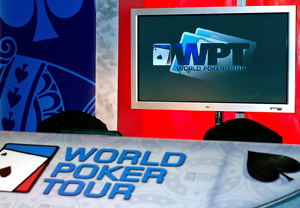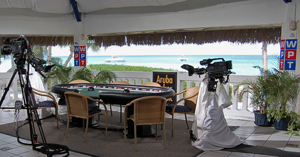 Poker players recognize that the World Poker Tour (WPT) played a key role in popularizing poker. In developing its televised tour, it introduced tournaments that got so popular as to begin to challenge the preeminence of the World Series of Poker. But while poker players may think of the WPT fondly, you will find few of the company’s stockholders who share that view.
Poker players recognize that the World Poker Tour (WPT) played a key role in popularizing poker. In developing its televised tour, it introduced tournaments that got so popular as to begin to challenge the preeminence of the World Series of Poker. But while poker players may think of the WPT fondly, you will find few of the company’s stockholders who share that view.
The latest straw was the company’s sale of its poker assets to a private “investment” company. As part of the deal, founder Steve Lipscomb will receive 5% of the $9,075,000 sale price. (It’s probably no coincidence that back in February, Steve worked out this arrangement should the company sell its assets in 2009) The shareholders, however, will not receive any distribution. Instead, they get to wait and see what “non-poker” business Lyle, Steve, and Brad eventually start in WPT’s place. For investors hoping to profit from the potential change in US online gaming laws, this was not what they had hoped for.
The stock message boards were flooded with irate posts. This one was just the tip of the frustration iceberg:
 “I wouldn’t mind this deal at all if the $1.35 per share was paid out as a dividend to shareholders. We’d basically be left with a risk-free option on the future online gaming revs of Gaminiyia. Instead, we’re left with $27M in cash in the hands of one of the most incompetent mgmt teams on the planet. ”
“I wouldn’t mind this deal at all if the $1.35 per share was paid out as a dividend to shareholders. We’d basically be left with a risk-free option on the future online gaming revs of Gaminiyia. Instead, we’re left with $27M in cash in the hands of one of the most incompetent mgmt teams on the planet. ”
Five years ago, WPT went public at $8 per share. Today it trades for a buck – although the stock was as low as $0.15 in November 2008. Over the years, it went from a potentially profitable production enterprise to a company with an identity crisis, chasing blindly after unprofitable business models.
 Frustration and envy appear to be the seeds of the series of missteps that sapped millions of dollars and focus away from the company’s core business. While the WPT helped create the poker boom, its television production business model only got a small piece of the obscene profits that were being generated by poker’s popularity.
Frustration and envy appear to be the seeds of the series of missteps that sapped millions of dollars and focus away from the company’s core business. While the WPT helped create the poker boom, its television production business model only got a small piece of the obscene profits that were being generated by poker’s popularity.
Online poker companies and online media sites reaped the lion’s share. This infuriated the WPT; they felt they were owed. This overarching motivation – to profit madly from the industry they helped to create and to keep others from profiting from it – was behind every wild goose chase the company embarked on. And it also may have been responsible for the mysterious $700 million bid for the company, attributed to legendary poker player Doyle Brunson.
In 2005, online poker sites were exploding with profits and the companies were exacting huge valuations. In June, PartyGaming’s IPO netted $8.45 billion on the London Stock Exchange and made its founders billionaires. While the WPT had done well – and had seen its stock price double – its market cap was still only a small fraction of what other publicly traded poker companies were trading at.
About a month after the PartyGaming IPO, a mysterious bid for the WPT of $700 million in cash was publicized – purportedly offered by Doyle. The offer was twice the value of the company’s market cap. Within days, however, the bid evaporated and the company’s stock that had soared on the rumor came back to near pre-bid levels. One investment reporter wrote, “In my years of watching the markets, I’ve never seen an offer made to buy a company with no details included in the bid. Something just doesn’t add up.”
Was the bid orchestrated to spur interest from other possible acquiring companies? Was it publicized to have Wall Street recognize the potential takeover value of the company and move the stock permanently higher? Although the SEC issued subpoenas to people associated with the ephemeral bid, it will be something we will never know. But instead of boosting Wall Street’s opinion of WPT, the bid only cast a suspicious pall over the stock.
 In 2006, WPT decided to enter the online poker business. Instead of going to a turnkey network, it spent a bundle to develop its own in-house platform. After many delays, it finally launched a homegrown platform rife with scale and performance issues.
In 2006, WPT decided to enter the online poker business. Instead of going to a turnkey network, it spent a bundle to develop its own in-house platform. After many delays, it finally launched a homegrown platform rife with scale and performance issues.
WPT’s television production company relied on the advertisements from online poker companies, but now they had become a competitor. Its online presence became a source of friction for its core business. And worse, its software was limiting its online revenue. WPT finally shed its own software and joined Cryptologic’s network in April 2007. WPT assured investors that the online poker profits would finally be rolling in. But by this time, Europe was a very competitive space for online poker and rivals already had established a foothold. After spending years and millions of dollars to develop its own online poker site, the WPT shut down its online poker operations in November 2008.
The other costly misstep by WPT was entering into a multi-year, multimillion dollar contract to help develop a traktor (a Chinese card game) tour in China. While WPT kept assuring investors that the deal would turn a profit, it never did. Even at the onset, people speculated whether it was WPT’s intention to ever make money, or just lock out other online poker companies from establishing a foothold in China. WPT recently pulled the plug on this venture.
But WPT even blew the little things. A number of online media sites started providing live coverage of WPT’s events. You would think the company would relish this free advertising of the company’s brand. But instead of reveling in the buzz, it tried to shut it down. Online sites made money via ad and affiliate money by driving traffic to their sites. And that was just one more source of income that WPT felt it had created but had not profited from. So even though the company had no source of ad or affiliate revenue, WPT spent money to develop and use its own in-house reporting team. The company also started restricting the access of other online reporters to WPT’s events. WPT was never going to profit from their in-house reporting team and web traffic – but they apparently didn’t care. If they weren’t going to profit from it, no one was.
That philosophy – attempting to block other companies from profiting from the poker boom — without having a way to profit from it themselves – may have been the company’s biggest failure. Sometimes corporate culture is a bitch.
For nostalgia’s sake, Steve Lipscomb’s 2005 open letter to the poker community can be found here.
5 Comments